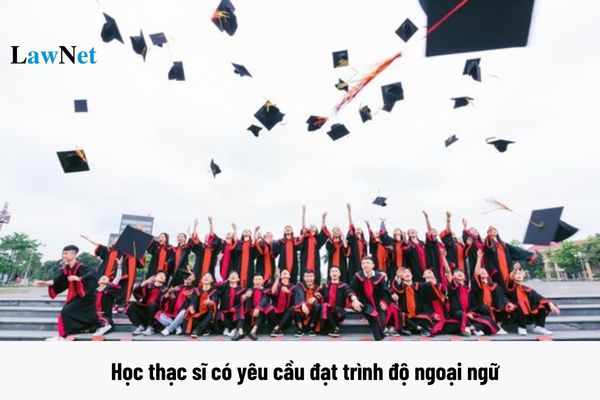Is obtaining Level 3 foreign language proficiency according to Vietnam's 6-level foreign language proficiency framework required to be eligible for the Master's training program?
Is obtaining Level 3 foreign language proficiency according to Vietnam's 6-level foreign language proficiency framework required to be eligible for the Master's training program?
Under Clause 1, Article 5 of the Regulations on enrolment and training for master’s degree issued together with Circular 23/2021/TT-BGDDT, the regulations on foreign language proficiency are as follows:
Enrollees and enrolment eligibility
1. Eligibility for enrolment:
a) Having graduated or eligible for recognition as university graduates (or equivalent or higher) in appropriate majors; in case of research orientation programs, graduating in good category or higher or making scientific publication in major that learners will study and/or conduct research;
b) Obtaining level 3 foreign language proficiency according to Vietnam's 6-level foreign language proficiency framework;
b) Satisfying other requirements of standard training programs issued by Ministry of Education and Training and requirements of training programs.
2. Appropriate majors specified under Clause 1 of this Article and other Articles hereof mean majors in university level (or equivalent or higher) that equip learners with necessary specialized basis to pursue master training degree of the respective majors and are specified in enrolment standards of master training degree; education institutions shall prescribe cases where additional academic requirements are to be satisfied prior to enrolment. For administration, management, and training majors in oriented application master program, appropriate majors in university level include majors directly related to administration and management majors.
...
Thus, according to the regulation mentioned above, obtaining Level 3 foreign language proficiency according to Vietnam's 6-level foreign language proficiency framework is required to be eligible for the Master's training program.

Is obtaining Level 3 foreign language proficiency according to Vietnam's 6-level foreign language proficiency framework required to be eligible for the Master's training program? (Image from the Internet)
What are the regulations on the Master's training program in Vietnam?
Under Article 2 of the Regulations on enrolment and training for master’s degree issued together with Circular 23/2021/TT-BGDDT, the regulations on the Master's training program are as follows:
- Master's training programs shall be developed, appraised, and issued by education institutions within research orientation or application orientation in a manner that satisfies requirements of Vietnam education level framework and regulations on standard training programs of Ministry of Education and Training.
- Training programs shall be provided for issuance of master’s degree according to these Regulations; no other higher education degree shall be issued.
- Training program applies to all training methods, training formats, and learners.
- Training programs must prescribe:
+ List of major suitable for learners who have graduated university level (or equivalent);
+ Foreign languages accepted for enrolment and graduation; foreign language requirements for enrolment and graduation for each learner must be of the same language.
- Training program must include mandatory contents according to regulations of Ministry of Education and Training.
- Training programs delivered in foreign languages must comply with regulations of Prime Minister.
- Changes and revisions relating to training program shall conform to applicable law provisions and must be publicized for learners prior to application.
What are the regulations on tuition and expenses of educational and training services in Vietnam?
Under Article 99 of the Education Law 2019, the specific regulations are as follows:
- Tuition is a contribution made by learners to partially or fully cover expenses of educational and training services. Tuition rate is determined based on road maps for assurance of expenses for educational and training services prescribed by the Government. For institutions of vocational education and higher education, this rate is calculated based on the Vocational Education Law 2014 and the Higher Education Law 2012.
- Expenses of educational and training services include the total amount of salary, direct costs, management costs and depreciation of fixed assets in direct or indirect service of educational operation in accordance with educational programmes.
Admission fees contributed by candidates when submitting an application or taking an entrance examination shall be determined based on road maps of accuracy and adequacy.
- Students at primary education level in public educational institutions are not required to pay tuition; in areas lacking public schools, primary school students in private educational institutions shall receive subsidies on tuition from the State, with the support rate specified by provincial People’s Councils.
- Pre-school children at 05 years of age in villages and communes with exceptional difficulties, ethnic minority areas, remote and isolated areas, coastal areas and islands shall be exempted from tuition.
- Pre-school children at 05 years of age beside those regulated in clause 4 of this Article and students at lower secondary education level shall be exempted from tuition based on road maps specified by the Government.
- Mechanisms for collecting and managing tuition and service fees of educational operation are prescribed as follows:
+ The Government shall set tuition collecting and managing mechanisms for public institutions of preschool education, general education, vocational education and higher education;
+ Provincial People's Councils shall set the tuition framework and detailed tuition rate and fees of services and assistance for educational operation in public educational institutions as authorised and at the proposal of provincial People's Committees;
+ Provincial People's Committees shall set collecting and using mechanisms for admission fees of each educational level under provincial management after receiving the approval from provincial People's Councils;
+ People-founded and private educational institutions are entitled to set the rate of their tuition and other service fees, ensuring expense recoupment and reasonable accumulation. Publicly announce expenses of educational and training services and fee rate as guaranteed in school’s establishment proposal; and on the basis of each educational course/level/year as prescribed by law.

